
Educating Horses and Riders with Lauren Lockliear of Demerara Stables
Blog
Educating Horses and Riders with Lauren Lockliear of Demerara Stables
Lauren Lockliear of Demerara Stables in San Gregorio, California built a successful program training horses and educating equestrians. The foundation of her training program is based on happy, fit horses, and emphasizes the importance of listening to them. Lauren grew up around horses in Florida and started working in barns when she was eight-years old. She loves the jumpers but also has a passion for classical dressage, and both are key to her program at Demerara Stables, however she works with horses in all disciplines.
“My first trainer was big into putting the horse first, and figuring out what was best for the horse,” she says. “It was before natural horsemanship was a thing, and it has shaped my philosophy in horse training.” That trainer had Lauren ride everything, and she fell into training as clients needed horses worked during the week, groomed, or wanted someone to ride a horse that was misbehaving.
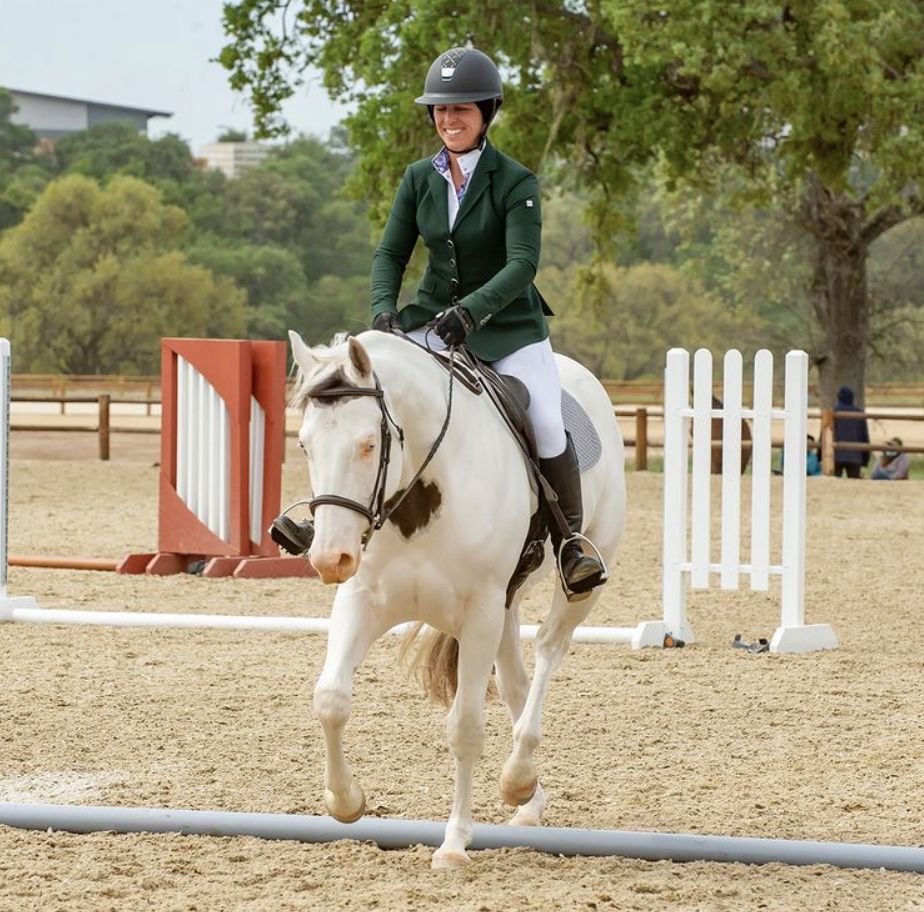
White Tux Only, owned by Janis Friedenberg Grube, competing at his first show at Paso Robles Horse Park. Photo: Lori Essence Captured.
Lauren enjoys riding young horses and the ones that no one else wants to get on and has developed a reputation for starting and training young sport horses and rehabilitating seasoned horses. “Stress, pain, or too much energy are the three things that make a horse misbehave. We can address most horse problems if we can fix these three things.”
In Florida, Lauren ran an active hunter jumper facility that specializes in training young horses and showing with clients. Lauren then moved to California and had a brief hiatus from the equestrian world to serve as an operations manager for a technology company. When she felt the horses calling her back, she decided to build Demerara Stables. Lauren’s father-in-law is an architect, and she designed the barn at Demerara with him. “I’ve worked in and visited hundreds of barns, and it gave me a well-rounded viewpoint of what I like and what doesn’t work. I also like to be very efficient and make it easy to care for the horses.”
The barn is designed to address two of the causes of behavioral issues seen in horses – stress and too much energy. The design allows horses at Demerara to see each other, is bright and airy, and the horses can access 24/7 turnout. It’s the ideal stress-free environment for the horses and incorporates all the efficiencies Lauren needs to manage the barn.
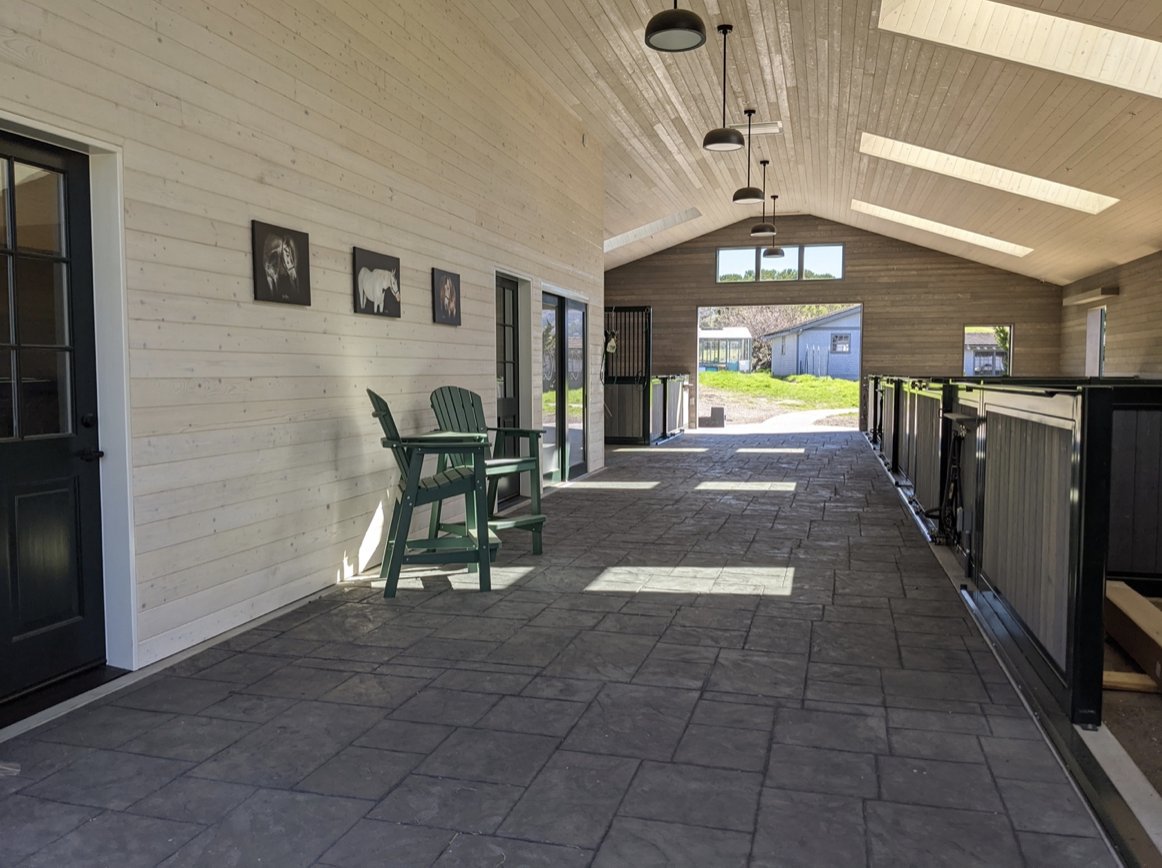
Barn aisle at Demerara Stables. The open plan allows horses to see and socialize with each other, while maximizing light and airflow. Photo: Lauren Lockliear
“I want my horses to be relaxed and I want to know when I get on them that they are in a relaxed frame of mind,” Lauren says. The active lifestyle the horses lead with full access to turnout also improves their fitness, and this becomes a competitive advantage.
Horse Training Philosophy
“Fitness is super important,” she continues. “I do a lot of walking and getting out of arenas. The stronger the muscles and cardiovascular systems are, the less strain on the soft tissues.” Lauren is a power lifter with over 20 years of experience. She understands the physiology of muscle strength and the importance of building that muscle strength to sustain physical activity.
Strong muscles are a key part of equine fitness. Lauren trots and canters hills at Woodside Horse Park with her horses as part of their fitness regimen. “Keeping horses fit doesn’t have to be a big production, even walking is helpful if your horse doesn’t walk a lot,” she says. “Do a lap around the farm or walk up a hill and then work up to more. My horse gets a 20-minute walk before and after each arena session, but we worked up to it, we started with five minutes. The more you work on it and build on it, the fitter your horse will be.”
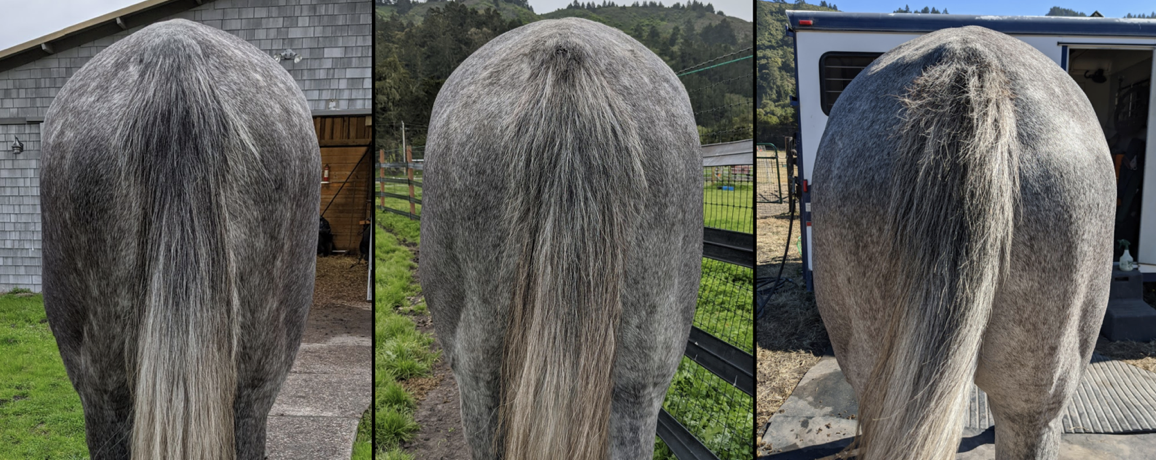
Zara, a five year old OTTB mare, showed great progress in her muscle development over six months. Photos: Lauren Lockliear
As a horse develops in Lauren’s training program, she’s able to see what that horse’s strengths and weaknesses are, which allows her to ascertain what discipline the horse will excel at. Training programs are then devised, based on what the horse enjoys and shows talent for. Hunters may work on developing a steady pace around a course, whereas a jumper may work on lengthening and shortening the stride and cantering in a more uphill balance. All horses spend some time outside of the arena as it varies their routine and builds their confidence.
Training programs that are tailored to the horse, their current fitness level, and talent eliminate any stress, pain, or extra energy the horse may have. This again leads to a relaxed horse that can excel as an athlete. The horse is just one part of the equation. Successful horses in any discipline need educated riders to guide them.
Educating Riders
Educated riders can understand the subtle cues a horse is giving and adapt to the needs of the horse while still pursuing training goals. Listening to the horse is one of the foundations of Lauren’s training program.
“Listen to your horse and educate yourself enough so you know what they’re saying,” she says. “I had a young horse come in for training that wouldn’t pick up its hind foot. I could have assumed the horse was being a jerk. Instead, I had the bodywork specialist in and discovered the muscles in this horse’s hind end were rock hard, possibly from a slip in the pasture. We fixed that – but if we hadn’t, there could have been serious issues with the horse. Don’t let signals go unnoticed.”
If you’re grooming your horse, and her back feels sore, Lauren recommends changing the plan for the day. Go on a long walk, long line her, or do something other than riding that won’t exacerbate that pain. Seek the advice of other professionals to diagnose and treat any pain-related issues. Lauren works with a saddle fitter, veterinarian, chiropractic specialist, and the bodywork specialist.
“Ask questions about what we’re doing and why,” Lauren says. “Ideally, I want to teach every one of my clients enough so that they could take their horse home and feel 100% empowered to do it on their own. I want people to be able to go off and do their own thing. I want people to be educated, get a signal from their horse, and then ask their trainer, ‘Hey, this just happened, what do you think?’ We all need to be advocates for our horses.”
Seeking education from multiple sources builds a better toolbox to understand the signals from our horses. Lauren loves sitting at the warmup ring and watching people work their horses. Other educational opportunities include going to a clinic to audit, taking lessons in a different discipline, watching the farrier shoe a lot of horses, and asking the vet questions. Lauren worked for a western pleasure trainer and uses what she learned with her own horses. She’s incorporated the trot and canter sets her neighbor, an endurance rider, uses into her training program as well.
Rider fitness is another part of educating equestrians. A strong rider is an equal partner in whatever the chosen discipline is. “Powerlifting has made a huge difference in my riding,” Lauren says. “I’ve strengthened my legs with squats and deadlifts. The thing that struck me about powerlifting is that my ability to stay in the saddle and hold myself close to the horse is much greater because I have strong legs. I sometimes deal with a lot of antics while riding, and I’m working less to stay in the saddle when something goes wrong. That gives me confidence that I can stay with a horse. Of course, being a professional and riding all of the horses myself and doing all of the barn chores is also a strength advantage.”
Equestrians should lift heavy weights in a way that helps them become stronger and ride better. This prevents a fall if a horse stops at a jump or spooks and unseats the rider. Lauren emphasizes that the takeaway is doing the thing that makes you want to exercise, it must be something you enjoy. There is no one thing or exercise every rider should do. Finding the exercise program, you enjoy will help keep you fit.
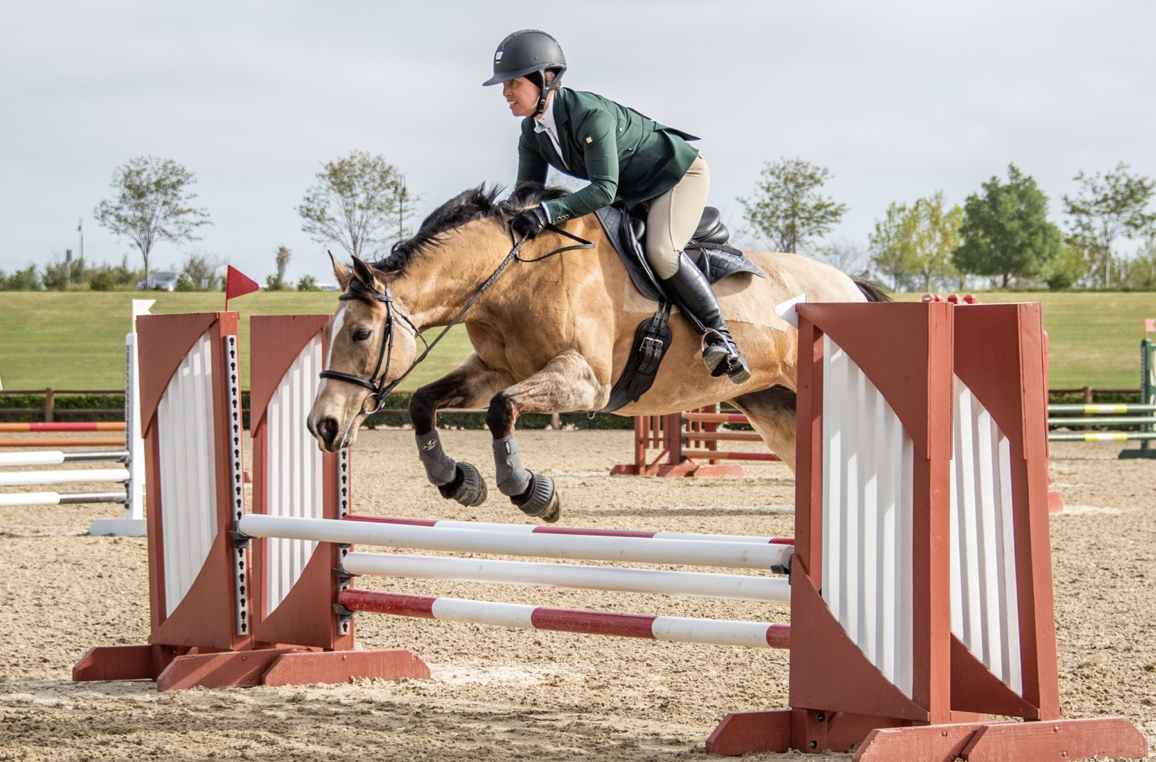
Pandora's Box, owned by Lauren Lockliear, at Paso Robles Horse Park. Photo: Lori Essence Captured.
Looking Ahead
“Having a relationship with the horse is the basis for so much trust. The horse needs that faith in you to jump something scary or do whatever else it is that you’re asking,” Lauren says. “They may be scared, but if they trust you, they will do it. I want a young horse to 100% know that nothing bad is going to happen when I’m getting on for the first time. I listen and know what their mindset is, and they know they can trust that I’m not going to hurt them.”
Lauren trained full-time in Florida for many years and had a busy stable. She took time off for the corporate world and has come back to training horses. Although Demerara Stables is a small, boutique training facility now, in five years, Lauren sees herself in a new facility with 300 acres, and a 50-stall barn.
“Right now, I don’t mind short-term horses because I love starting baby horses and have a small facility. But I want a program in five years where I’m moving young horses up through the levels, showing, and having long-term clients,” she says. “I also want to bring in working students and share my knowledge. I’m a firm believer in owner education – why we are using this bit, what it feels like when the horse uses their back correctly, how to fit the saddle, and who to use as a saddle fitter. I want to show people different ways of caring for horses; they don’t have to do it my way, but I want to educate them so that they can pick what’s best for them and their horse.”
Learning is a lifelong process and with horses, there is always something new to learn because each horse is an individual. Lauren Lockliear shows us through her work at Demerara Stables the importance of listening to the horse and building fitness. This winning combination leads to successful equestrians in any discipline.
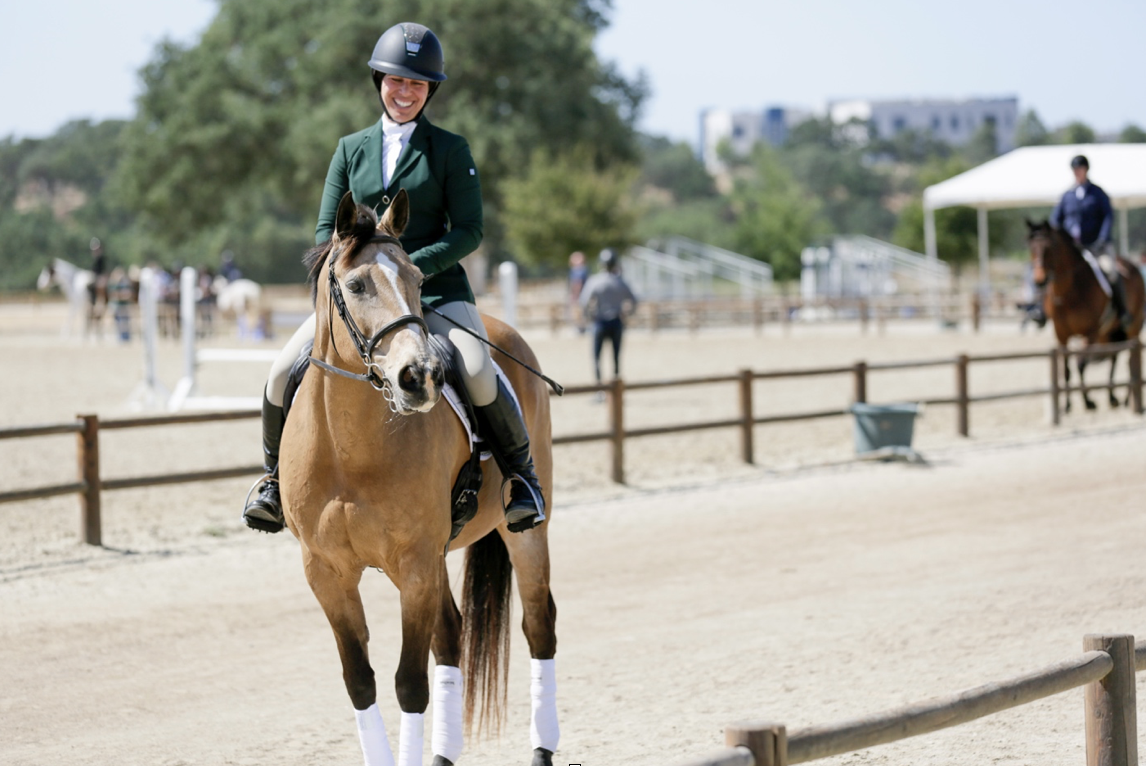
Pandora's Box, owned by Lauren Lockliear, at Paso Robles Horse Park. Photo: Lori Essence Captured.
Visit Lauren and Lauren and Demerara Stables at ProEquest!
You can follow Lauren and Demerara Stables at instagram.com/demerarastables/.
